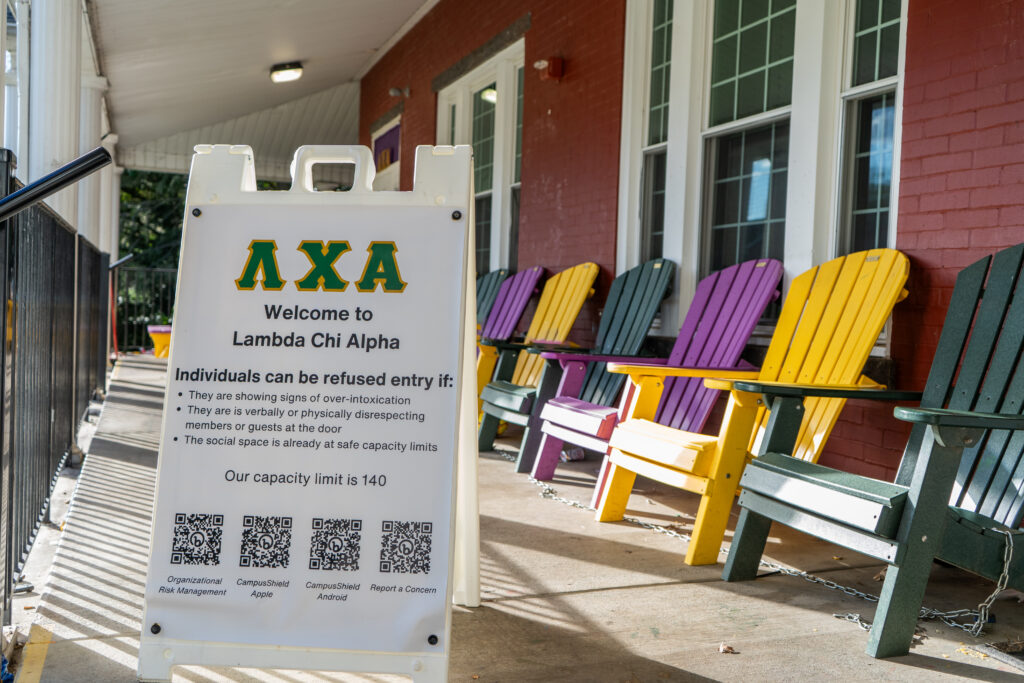By Ella Prieto, Managing and News Editor
In February 2020, Sigma Alpha Epsilon (SAE) member Ryan Ahern ’20 showcased his campaign to combat sexual assault titled “Not In Our House.” He gave a presentation to a filled CUB Ballroom, containing brothers of various fraternities across campus.
A month later, however, the COVID-19 pandemic shut down Gettysburg College, preventing the program from gaining traction. Despite this setback, the Interfraternity Council (IFC) prepared to relaunch Not in Our House in the fall semester of 2022, and Caden Simons ’24 and Ries Faller ’22 spearheaded the campaign.
In the spring semester of 2023, IFC President Jacob Kezmarsky ’24, IFC Director of Community Engagement Chair Cameron Case ’25 and IFC Inclusion Chair Henry Namiot ’23 continued this work. They collaborated with the Office of Student Activities & Greek Life (OSAGL) Assistant Director Trevor McClenon and Title IX Director Amanda Blaugher to return the program.
Now, in the fall semester of 2023, Not in Our House has officially been relaunched. Kezmarksy and Case, who still serve in their IFC leadership roles, discussed how they have crafted the program.
They had continued help from Blaugher and McClenon, who also serves as the IFC Advisor. In addition, Executive Director of Counseling and Wellness Krista Dhruv and Campus Safety Captain Travis Griffie supported and helped coordinate the IFC’s attendance at advocacy events. Kezmarsky and Case were also guided by the anonymous survey results they received from all fraternity presidents, the Panhellenic Executive Board and all sorority women last spring.
“We are trying to really reach out to different groups and trying to make sure that through this program fraternity members see the benefits and better ourselves,” explained Case.
From those sources, they have implemented features that can be split into two parts: advocacy events and transparency.
The transparency aspect consists of Risk Management Plans being posted on the IFC website. These plans contain blueprints of six out of the seven fraternity houses on campus. They are labeled to show where sober monitors and TIPS-trained individuals are located, as well as the areas where food and non-alcoholic beverages are, which are available to all guests during social events.
“If you need to find somebody, you can find where a sober monitor will be on that Risk Management Plan,” said Case. “So if you’re in need of somebody or you need something, that’s another way that we are making that an option for people.”
Additionally, there are now signs in the fraternity houses that state the expectations and rights of guests who attend social events, as well as QR codes to the Risk Management Plans, a site to report concerns and the new Campus Shield App by Campus Safety.
The other aspect, advocacy events, involves three topics: mental health, sexual assault awareness and health and safety. The specific events that corresponded with these were Fresh Check Day, the Consent Fair and Campus Safety Day. The expectation for these events was that 85% of fraternity men would attend at least one event, which was approved by the IFC through a vote. The final percentage was that 90% of fraternity men attended one event, a significant jump in events from last year.
Along with these events is an educational component that is decided and executed on a chapter-by-chapter basis.
“Each chapter coordinates one topic they are interested in learning more about…and that’s an ongoing thing that chapters are expected to do,” stated Case.
Fraternity men are also encouraged to attend speakers brought in through offices like Counseling and Wellness and Sexual Respect and Title IX as well as events like the “It’s On Us Week of Action.”

IFC Director of Community Engagement Chair Cameron Case ’25. (Photo William Oehler/The Gettysburgian)
When chapters are compliant with all of the Not in Our House rules, they can fly the Not in Our House flag and are acknowledged in the community for their work on violence and sexual assault prevention. However, Kezmarsky and Case do not anticipate many, if any, houses to not be compliant as they feel that all the chapters have been engaged with the program and report that there has been no pushback.
Other fraternity men have also spoken positively of Not in Our House. Phi Delta Theta’s Risk Manager Rush Ehrhart ’24 commented, “I think the program does a great job at exposing fraternity members to educational information on sexual misconduct and awareness. This makes my job [as Risk Manager] easier, as I am more able to hold those accountable for their actions when they are in the know with the expectations due to their educational experiences. This in turn creates a safer community at Gettysburg for everyone.”
President of Sigma Chi Michael Baehre ’24 concurred with Ehrhart, stating that the Not in Our House values aligned with Sigma Chi’s as well
“Here at Sigma Chi we pride ourselves on having a zero tolerance policy with sexual assault in any way shape or form,” said Baehre. “We will continue to be an advocate for education and proactive thought on this campus. We want people of all different creeds and convictions to feel welcome and accepted in our house.”
Blaugher also feels the program is valuable: “Since Not In Our House is a completely Student Designed program, it really has allowed for IFC to look at what topics they want to cover and expand upon to deepen their learning and awareness. Additionally, the desire to increase transparency is important for the entire campus community… Men play a huge role in Violence Prevention, and getting them to a place where they understand that role is essential to see continued change on campus.”
Kezmarsky, who has been essential in bringing back the program, will graduate this year, and his presidency of the IFC ends in December. Despite this, he is confident Not in Our House will continue.
“I have been planning on receiving feedback from a couple of different avenues to see what we are doing well and what we can improve on in the future,” said Kezmarksy. “So I can hand that off to the next person that will run for my position, and they can succeed.”
This article originally appeared on pages 4 to 5 of the No. 2 October 2023 edition of The Gettysburgian’s magazine.


